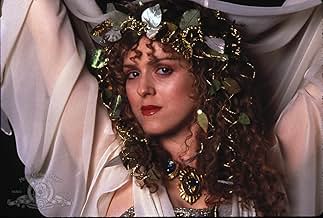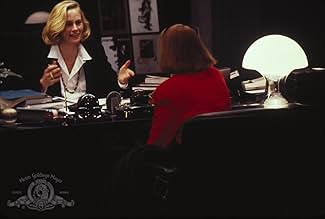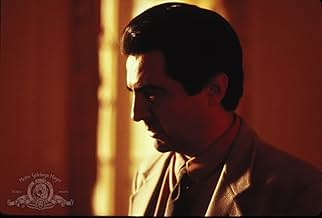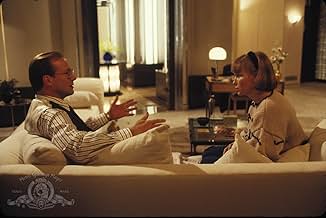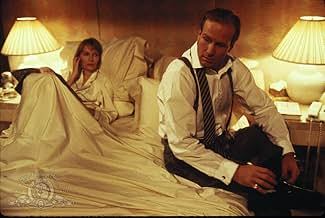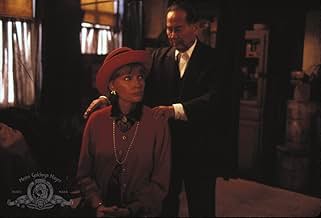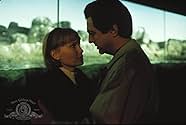A spoiled Manhattan housewife re-evaluates her life after visiting a Chinatown healer.A spoiled Manhattan housewife re-evaluates her life after visiting a Chinatown healer.A spoiled Manhattan housewife re-evaluates her life after visiting a Chinatown healer.
- Nominated for 1 Oscar
- 1 win & 7 nominations total
Matthew H. Williamson
- Dennis
- (as Matt Williamson)
- Director
- Writer
- All cast & crew
- Production, box office & more at IMDbPro
Storyline
Did you know
- TriviaSean Young filmed a small role, but it was later cut. She had been deleted from Woody Allen's previous film Crimes and Misdemeanors (1989) as well.
- GoofsWhen Thelonious Monk's version of "Darn That Dream" appears on the soundtrack, the LP sleeve of "Monk's Dream" is shown, implying that Alice and Joe are listening to it. However, the tune is not featured on that album.
However, implications are not necessarily fact; it might be that Alice and Joe had been listening to several Monk albums and had not been meticulous in returning the discs to the appropriate sleeves.
- SoundtracksLimehouse Blues
Written by Philip Braham & Douglas Furber
Performed by Jackie Gleason
Courtesy of Capitol Records, Inc.
By arrangement with CEMA Special Markets
Featured review
Or "Alice Doesn't Live Here Anymore" (Scorsese fans will get the reference), there seems to be some inner-girl escape-impulse associated to the name Alice and Woody Allen's heroine, played by the irresistible Mia Farrow, is no exception.
Alice is married to Doug, a wealthy businessman played by William Hurt. Together, they live in a luxurious apartment of Manhattan, her kids go to a private Catholic school, she's got a baby sitter, a cook, a trainer, a decorator, and all the time in the world to go shopping, get beauty treatments, gossip with her friends... and worry.
Some deep torment expresses itself through backaches and a sort of Catholic guilt due to her infatuation on Joe Ruffalo, a dark and handsome Jazz musician played by Joe Mantegna. Something is burning inside, channeling itself through that innocent lust, behind the obvious, there might be some strong existential call. Following numerous advice, Alice visits Dr. Yang (Keye Luke) a herbalist who seems to know what it's all about, certainly not the back.
The film deals with serious matters such as existential boredom, meaning of life, infidelity, but the "Chinese Riff" and tango leitmotifs remind us that this is all played for laughs, so we're not surprised when the treatment ventures in the realm of fantasy. Comedy needs that extra-kick when the laughs are too mild-mannered. For instance, when Alice mentions that penguin mate for life, Yang's answers "you think they're Catholic?" echo the infamous 'pigeon' quote from "Hannah and her Sisters" and it's not a good sign when Allen recycles his own jokes.
Only halfway through the film when the adoration of Mother Teresa and a few references about childhood reemerged that I understood that Catholicism wouldn't be the butt-monkey of Allen's humor but something with a strong bearing on Alice's guilt and existential crisis. Something that can be summed up in that quote from "Inherit the Wind": "What touches you, what warms you? Every man has a dream. What do you dream about? What... what do you need?"
The answer is surely not in Alice's life, Doug constantly belittles her ambitions, a TV series executives played by Cybil Shepherd dismisses her writing projects, and everyone treats her with relative condescendence. It's hard to believe that the film was released 22 years after "Rosemary's Baby". Here is Mia Farrow as a middle-aged mother caught in the suffocating coziness of an apartment supported by seemingly benevolent people and looking as frail, powerless and "young" as her Rosemary counterpart.
I guess fragility has always been Mia's strongest suit, one she wears with grace and gentleness, the only negative feeling she's capable to embody is that Catholic guilt less as a principle than an alibi to her incapability to fight, except her own demons. That's Alice Tate in a nutshell, and one can draw parallels with Cecilia from "The Purple Rose of Cairo", a woman who could only find artifices to escape her condition (and coincidentally, the film became my highly rater movie for helpfulness).
So there's one thing that Woody Allen's "Alice" gets right is the casting, Diane Keaton is too strong and free-spirited to fit the character. It's obvious Allen wrote it for and with Mia in mind, a few years before their marriage would collapse, foreshadowing of many scandals and accusations. I'd rather ignore the storm and contemplate the silence; this is one of Mia Farrow's best roles and it was written by someone who obviously knew her a lot and loved her enough to provide her a character with a happy ending, not bittersweet but happy. Mia was overdue one.
There's a catch though, she's so sweet and genuinely sympathetic that she' not really the best choice for a leading comedic role, it's not a case of "women can't be funny" but there's a moment where after drinking of a mixture, she learns how to talk with a seductive voice and talks sexy with Joe , who responds nervously. That scene was funny but it was incongruous and I was afraid it would be a "reveal your inner self" moment. I needed to relate to the real Alice, which happens to be in line with Mia's personality.
So the film is a series of situation where a fantasy device allows Alice to know about her husband's whereabouts, to talk with her deceased ex-boyfriend, a sexy bad boy played by Alec Baldwin, to have a hilarious talk with her muse played by Bernadette Peters, to talk with her mother... it's basically a psychoanalysis through magical plants with many visual gags, some genuinely good moments, especially the visit to her sister played by Blythe Danner, but we're never taken to the heights reached by "Hannah and Her Sisters" or "The Purple Rose of Cairo" except for a hilarious sequence involving a love potion.
Despite a few moments of creativity, the film is Woody Allen at his mildest, driving us at cruise speed to a satisfying ending where Alice finally fulfills her dreams because she knew how to control herself and get rid from her entourage's nuisance, embodying that quote from a French great man named Clemenceau: "in life, you've got to know what you want to do, have the courage to say it and the energy to do it."
Still, had they made a "Real Housewives of Manhattan" in 1990, I wonder if a character like Alice Tate would have been kept in regard to audiences' premises. She'd be just too gentle, too shy, too introverted to contribute to the narrative dynamics... and yet she is the titular heroine of a film with a high promise, the result is uneven, it's heart-warming but slow-paced though not deprived of interesting dynamics.
Maybe there's a reason why it's rarely mentioned among Allen's best... but never among his worst. Some would call it a gem, I would call it an enjoyable little film. Which is good enough.
Alice is married to Doug, a wealthy businessman played by William Hurt. Together, they live in a luxurious apartment of Manhattan, her kids go to a private Catholic school, she's got a baby sitter, a cook, a trainer, a decorator, and all the time in the world to go shopping, get beauty treatments, gossip with her friends... and worry.
Some deep torment expresses itself through backaches and a sort of Catholic guilt due to her infatuation on Joe Ruffalo, a dark and handsome Jazz musician played by Joe Mantegna. Something is burning inside, channeling itself through that innocent lust, behind the obvious, there might be some strong existential call. Following numerous advice, Alice visits Dr. Yang (Keye Luke) a herbalist who seems to know what it's all about, certainly not the back.
The film deals with serious matters such as existential boredom, meaning of life, infidelity, but the "Chinese Riff" and tango leitmotifs remind us that this is all played for laughs, so we're not surprised when the treatment ventures in the realm of fantasy. Comedy needs that extra-kick when the laughs are too mild-mannered. For instance, when Alice mentions that penguin mate for life, Yang's answers "you think they're Catholic?" echo the infamous 'pigeon' quote from "Hannah and her Sisters" and it's not a good sign when Allen recycles his own jokes.
Only halfway through the film when the adoration of Mother Teresa and a few references about childhood reemerged that I understood that Catholicism wouldn't be the butt-monkey of Allen's humor but something with a strong bearing on Alice's guilt and existential crisis. Something that can be summed up in that quote from "Inherit the Wind": "What touches you, what warms you? Every man has a dream. What do you dream about? What... what do you need?"
The answer is surely not in Alice's life, Doug constantly belittles her ambitions, a TV series executives played by Cybil Shepherd dismisses her writing projects, and everyone treats her with relative condescendence. It's hard to believe that the film was released 22 years after "Rosemary's Baby". Here is Mia Farrow as a middle-aged mother caught in the suffocating coziness of an apartment supported by seemingly benevolent people and looking as frail, powerless and "young" as her Rosemary counterpart.
I guess fragility has always been Mia's strongest suit, one she wears with grace and gentleness, the only negative feeling she's capable to embody is that Catholic guilt less as a principle than an alibi to her incapability to fight, except her own demons. That's Alice Tate in a nutshell, and one can draw parallels with Cecilia from "The Purple Rose of Cairo", a woman who could only find artifices to escape her condition (and coincidentally, the film became my highly rater movie for helpfulness).
So there's one thing that Woody Allen's "Alice" gets right is the casting, Diane Keaton is too strong and free-spirited to fit the character. It's obvious Allen wrote it for and with Mia in mind, a few years before their marriage would collapse, foreshadowing of many scandals and accusations. I'd rather ignore the storm and contemplate the silence; this is one of Mia Farrow's best roles and it was written by someone who obviously knew her a lot and loved her enough to provide her a character with a happy ending, not bittersweet but happy. Mia was overdue one.
There's a catch though, she's so sweet and genuinely sympathetic that she' not really the best choice for a leading comedic role, it's not a case of "women can't be funny" but there's a moment where after drinking of a mixture, she learns how to talk with a seductive voice and talks sexy with Joe , who responds nervously. That scene was funny but it was incongruous and I was afraid it would be a "reveal your inner self" moment. I needed to relate to the real Alice, which happens to be in line with Mia's personality.
So the film is a series of situation where a fantasy device allows Alice to know about her husband's whereabouts, to talk with her deceased ex-boyfriend, a sexy bad boy played by Alec Baldwin, to have a hilarious talk with her muse played by Bernadette Peters, to talk with her mother... it's basically a psychoanalysis through magical plants with many visual gags, some genuinely good moments, especially the visit to her sister played by Blythe Danner, but we're never taken to the heights reached by "Hannah and Her Sisters" or "The Purple Rose of Cairo" except for a hilarious sequence involving a love potion.
Despite a few moments of creativity, the film is Woody Allen at his mildest, driving us at cruise speed to a satisfying ending where Alice finally fulfills her dreams because she knew how to control herself and get rid from her entourage's nuisance, embodying that quote from a French great man named Clemenceau: "in life, you've got to know what you want to do, have the courage to say it and the energy to do it."
Still, had they made a "Real Housewives of Manhattan" in 1990, I wonder if a character like Alice Tate would have been kept in regard to audiences' premises. She'd be just too gentle, too shy, too introverted to contribute to the narrative dynamics... and yet she is the titular heroine of a film with a high promise, the result is uneven, it's heart-warming but slow-paced though not deprived of interesting dynamics.
Maybe there's a reason why it's rarely mentioned among Allen's best... but never among his worst. Some would call it a gem, I would call it an enjoyable little film. Which is good enough.
- ElMaruecan82
- Mar 21, 2019
- Permalink
Details
- Release date
- Country of origin
- Languages
- Also known as
- 艾莉絲
- Filming locations
- Production companies
- See more company credits at IMDbPro
Box office
- Budget
- $12,000,000 (estimated)
- Gross US & Canada
- $7,331,647
- Opening weekend US & Canada
- $36,274
- Dec 25, 1990
- Gross worldwide
- $7,331,647
- Runtime1 hour 46 minutes
- Color
- Aspect ratio
- 1.85 : 1
Contribute to this page
Suggest an edit or add missing content



